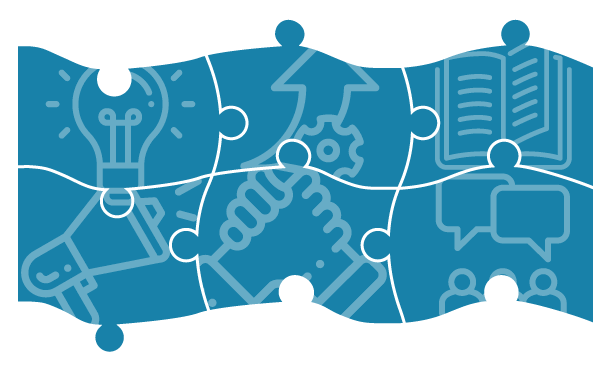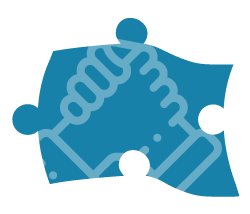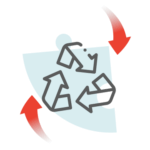Sustainability Principles
Representing the packaging value chain, AMERIPEN believes our primary role is to optimize the value of packaging while minimizing any associated social, environmental, and economic challenges. Using a materials management lens, discarded packaging can be managed at the end of its life while optimizing product protection thus reducing waste and maximizing resources.
The packaging industry remains committed to advocating for progressive, proactive, and evidence-based strategies to advance sustainable packaging systems. To advance that objective, we apply the following principles:

Sustainability Stories
Creating Sustainable Packaging Across the Value Chain
For many AMERIPEN members reaching 100% reusable, recyclable or compostable packaging is more than a goal, it’s a strategic initiative. In their efforts to reduce environmental impact by increasing the circularity of packaging, our members recognize the value of collaboration and the importance of working across the packaging value chain. Learn below how AMERIPEN members are working to advance end of life recovery and reuse of packaging.
When we consider life-cycle impacts and work collaboratively across the value chain, we can design packaging that provides increased product protection and reduced environmental impact. By balancing both design needs with end-of-life solutions we can create sustainable packaging value chains.

The materials and formats we use to design packaging can play a significant role in its ability to be recycled or composted.
Member Case Studies:
Dow has created a new water-based, Volatile Organic Compounds (VOC) which help laminate multi-material films together. As a water-based adhesive, ROBOND™ permits for easy separation during the recycling process. By creating a process that helps for improved sortation of multi-material films, Dow's innovation will improve plastic sortation to produce higher and better quality recyclate. ROBOND™ has received recognition by the Association of Plastics Recyclers (APR) Critical Guidance Process which recognizes innovations to improve packaging recycling.
NOVA is on track to achieve its target goal of providing 1 billion pounds of recycled plastic resins. NOVA offers a portfolio of recycle-ready polyethylene resins that retain their physical properties when processed multiple times through mechanical recycling. They also offer, the BONFIRE film development platform, a robust set of online tools to help designers find the most promising resins and structures to meet their specific requirements. These tools help reduce the number of physical trials needed to facilitate the development of recyclable mono-layer structures and incorporating recycled polyethylene. Investments into community collection and recycling programs are also part of their strategy to ensure customers can access increased recycled resins to meet their packaging goals.
Converters are often the linchpin to creating recyclable packaging. Converters work with material suppliers and their own innovation teams to find creative ways to meet brand goals. Often this requires converters to develop deep and complex relationships across the packaging value chain.
Member Case Studies:
AMERIPEN member Berry Global has long invested in numerous recycling technologies and partnerships in order to increase their access to recycled content. In October 2021, Berry announced plans to produce a food-service drinking cup made with recycled polypropylene. Through a partnership with a chemical recycler and food-service retailer, the three companies will work to collect, recycle, re-manufacture and sell plastic drinking cups with 20% recycled content. While the immediate goal of this initiative is to divert 10 million pounds of waste from landfills in two years, all three partners believe this is a step towards increased recycled polypropylene for food service packaging.
Hi-Cone, a manufacturer of plastic can ring carriers recognized customers interest in recycling ring carriers but identified that very few curbside recycling programs accept flexible LDPE films like theirs. To resolve this Hi-Cone has partnered with an LDPE recycler to collect and reprocess their ring carriers. Consumers can require a free shipping label at www.ringrecycleme.com to send used carriers direct to a recycler. Hi-Cone has committed to a multi-year purchasing agreement this recycler to ensure they have a secure market for selling recycled LDPE. Creating a virtuous loop, Hi-Cone then offers its customers ring carriers with 50% PCR. According to LCA data, Ring carriers with 50% PCR result in 90% less energy, 83% less water, 75% less GHG and 93% less solid waste than 100% virgin plastic carriers. Through this recycling initiative, Hi-Cone hopes to transform its full portfolio of ring carriers to 50% PCR content resulting in an estimated 25- million-pound reduction of virgin plastic LDPE per year.
Many AMERIPEN brand members have set goals to increase the recyclability and recycled content of their packaging. Partnerships with raw material suppliers and converters are essential to success.
Member Case Studies:
Mondeléz International reports that 93% of its packaging portfolio is already designed for recycling. Their next goal is a minimum of 5% recycled content across all their plastic packaging. Obtaining recycled content for food packaging can be difficult due to high regulatory requirements to ensure direct food contact safety. Through a partnership with Berry Global and a diversified chemical firm, Mondeléz International’s Philadelphia cream cheese containers, sold in Europe, will now include recycled content. Commitments between brands and recyclers to secure markets for advance recycling technology are valuable in advancing and scaling the growth of these promising technologies.
In 2022, McCormick & Company announced the transition of their plastic food coloring bottles from virgin PET to 100% recycled PET. This announcement was the outcome of a multi-year research and development effort between McCormick and Berry Global, a plastic converting company. Both McCormick and Berry believe that increasing recycled content within packaging formats is a key strategy to helping them meet their climate goals as the energy demand to process recycled plastics is less than that of manufacturing virgin plastics. This transition from virgin to 100% recycled will result in a GHG reduction of approximately 59% for the food coloring packaging. Berry works with a variety of plastics re-processors to ensure supply of recycled content and is currently investing in emerging technologies to explore both chemical and mechanical recycling options to increase the availability of food-grade recycled content. Purchase agreements with brands like McCormick help ensure reliable demand for investments into recycling.
In spring 2021, Nature Valley, launched the first fully recyclable polyethylene bar wrapper. "As leaders in the granola bar category, we feel a responsibility to continue innovating and encouraging future solutions that could make recycling wrappers even easier,” says Brian Higgins with General Mills, which created Nature Valley and launched the category in the 1970s. The recyclable wrapper was a multi-year effort that included close partnerships with plastics recyclers to ensure it met their strict standards. The new film also carries the How2Recycle® label for store drop off, and Nature Valley encourages consumers to return it to stores with their "bag of bags". In hopes of expanding this technology, General Mills did not seek a patent and encourages others to pursue it.
Rapid innovation within the packaging industry often exceeds the speed in which the recycling industry can follow. By working with recyclers to balance packaging value with end of life consideration, the packaging industry can advance true sustainability.
Member Case Studies:
The primary purpose of packaging is to protect the products within. Sonoco's iconic fiber based containers with steel bottoms are an example of a technology that plays a significant role in reducing food waste. Manufactured with two different materials (fiber and steel) some MRFs and curbside communities have argued these containers are difficult to recycle. Sonoco worked with two consulting firms, and an advanced robotic sortation company to map the movement of these containers through a typical municipal recycling process. The studies showed that in most cases, traditional MRFs would direct this packaging to steel bales and the robotic technology could easily identify and sort these containers correctly. The result, a 45% decrease in climate emissions over landfilling. Further, depending on the product within, these containers could extend the shelf life of food from 20 days to two years!
A leading glass producer, Owens Illinois (OI) is also a leading glass recycler. OI has several targeted initiatives aimed at growing and improving glass recycling. OI works independently and with partner organizations like the Glass Packaging Institute to provide community grants, help with purchasing glass recycling and sorting infrastructure and promote best practices for glass recycling. Rather than see themselves as competitor with other glass recyclers, OI aligns itself with other re-processors to help increase curbside access to glass recycling and providers multi-year supply contracts with other re- processors to ensure there is a robust end market demand for recycled glass. OI has set a goal of 50% PCR in all glass products, noting that for every 10% increase in recycled content for glass products leads to a 5% reduction in carbon emissions and a 3% reduction in energy use. Since glass recycling and production is a highly local effort, investments into increased recycled content are not just good for our environment but they also create a robust domestic recovery economy. For every 1,000 ton of glass that is recycled, 8 local jobs are created.
Sonoco recently transitioned one of their paper Mills from a virgin corrugated manufacturer to a 100% recycled content paperboard manufacturer. The new 100% recycled paperboard machine will be one of the largest machines for recycled paperboard in the world. Sonoco’s new Mill—deemed Project Horizon has been designed to produce 180,000 tons per year of high-quality recycled paperboard for industrial and consumer packaging. The Mill has invested in a state-of-the-art fiber cleaning and mixing system to permit Sonoco to utilize inputs of post-consumer fibers that are considered lower quality due to higher rates of contamination without impacting the quality of their paperboard. Sonoco estimates the transition to a 100% recycled Mill will not only reduce their operating cost by an estimated $30million because of the reduced energy demand and chemicals needed when recycling paper, it will also provide a robust domestic market for curbside collected paper, paperboard and corrugate. As one of the world’s largest integrated paper company, the company already sees increased demand for recycled paperboard across their existing customer base and this move is a step toward supported public demand for increased recycled content










